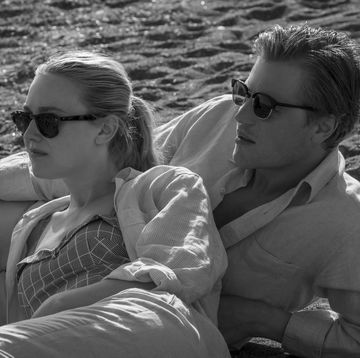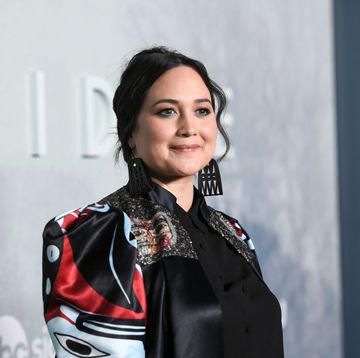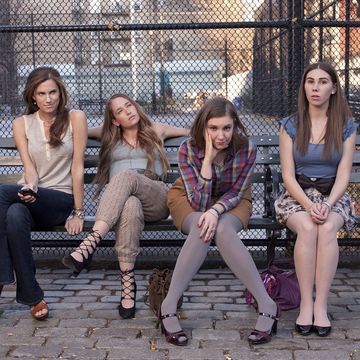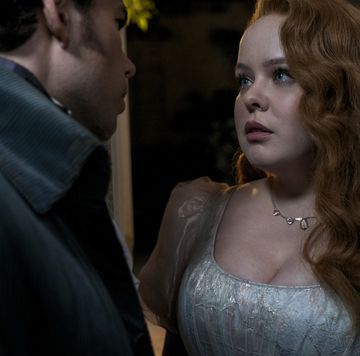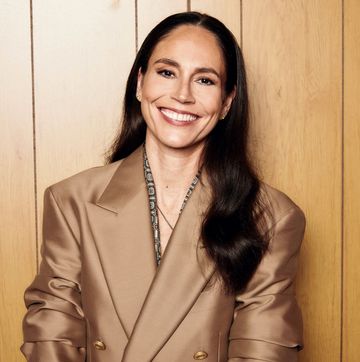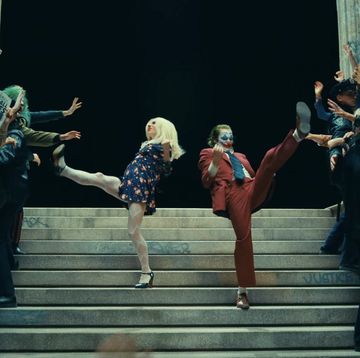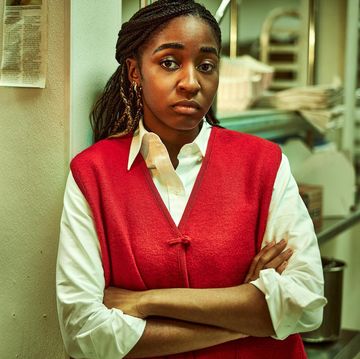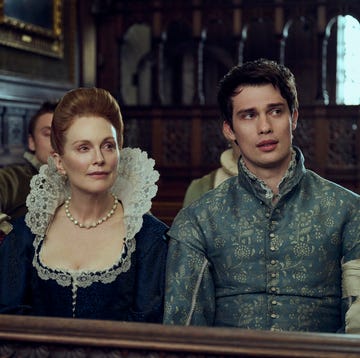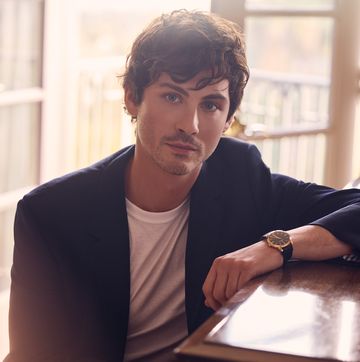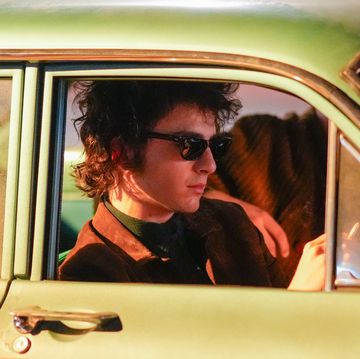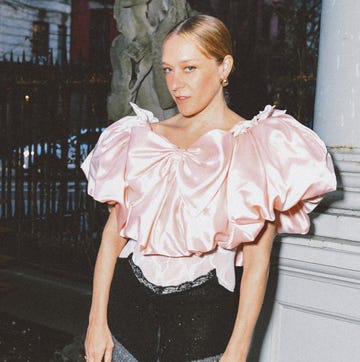"I asked her if she thought my kids would one day appreciate my career," Diablo Cody says of Meryl Streep, who stars in this summer's Ricki and the Flash, written by Cody and directed by Jonathan Demme. "She said, 'No, probably not.'" The movie, inspired in part by Cody's rocking mother-in-law goes deep on the subject of parenthood both for Cody, a mother of two with one on the way, and Streep, who shares the screen with Mamie Gummer, Streep's daughter onscreen and off. Cody is a hell of a lot of fun to talk to, not just because she's emerged as one of the most prominent feminist voices (and overall voices) in Hollywood's writing community but because she's as candid as she is whip-sharp. Gearing up for Ricki's August 7 release, Cody opens up about sexy sexagenarians, Hollywood friendships (including her own squad, self-dubbed the "Fempire"), and what she plans to tell her kids about stripping.
Harper's BAZAAR: What's the story of Ricki and the Flash in a nutshell?
Diablo Cody: Meryl Streep plays this woman named Linda Brummel who has been sort of leading a double life for decades as this rock star named Ricki Rendazo—and I'm using the term rock star loosely because she is the lead singer of a bar band that really never made it. She has three kids, and years prior she sort of left her family and moved to Los Angels to try and make it. Now, years later, her daughter Julie—played by Meryl's real daughter, Mamie—is having a nervous break down while going through a divorce, and for the first time in a very long time Ricki has to go home and make things right with her kids and ex-husband.
HB: It's loosely based on experiences from your own life. How so?
DC: Well, the dramatic meat of the story is not related to my own life at all. But I was inspired to write the script because my mother-in-law is the lead singer of a bar band in New Jersey, and she is amazing. She's till playing every weekend and is super committed to her music. You would never go to see this woman and think, "That's a mother of six." She's, like, dancing up on the bar in leather pants and singing AC/DC, and people are going nuts.
HB: Was Meryl's character inspired by any other lady rockers?
DC: When I was writing it, I was thinking about Stevie Nicks, Joan Jett, maybe a little Melissa Ethridge, and my mother-in-law. Meryl really helped create the character too. She would say, "This is what I see her wearing… This is how I see her hair… She reminds me of this person and this person…"
HB: We can expect some unconventional sexy scenes, is that right?
DC: Rick Springfield is super hot, and I can't remember seeing a movie with two people in their '60s hooking up, which I think is important. Older love is crucial, as is just writing a tour-de-force role for an actress who isn't 24. That was important to me.
HB: How do you approach writing a sexy scene differently for older people?
DC: I don't! I don't at all. That's what radical. And I think people like it. Me and the director are probably kind of crazy because we always sit there and go, "Oh my god, this is so hot." But it is!
HB: What's the music in the film like?
DC: What you're hearing in this movie is 100% what was recorded that day, and it's really Meryl playing and signing. We all know she can sing, but she learned to play guitar for this.
HB: Who are your personal rock idols?
DC: I love Tim Gordon and Liz Phair, and I love Katy Perry, who I consider a rock star. I love Fleetwood Mac. They get a couple of shout outs in the movie.
HB: What was one of your most memorable moments working with Meryl?
DC: Mark Platt, one of the producers, and I had taken her out and were trying to woo her into doing the film—and that point, I didn't know that she had decided that she was going to. I told her that, to me, one of the most important aspects of this story was the idea that sometimes your kids don't necessarily care what you've achieved; they just want you to be there when they don't feel well or when they're hungry. I asked her if she thought my kids would one day appreciate my career, and she said, "No, probably not."
HB: How old are yours?
DC: Two and a half, four and a half, and I have one on the way.
HB: Since your work often centers on women's issues, and you've become a prominent female voice in Hollywood, do young women often reach out to you?
DC: Yeah! People reach out to me a lot, and I always feel bad. I have no wisdom to impart because I've had such an unconventional career. If some young woman comes to me and says, "What should I do to get my first picture produced?" I can't be like, "Okay, first you need to write a book about how you were a stripper." I don't have a really nice prescribed path that I can suggest to people.
HB: Have you ever spoken to your kids about your stripping? Do you plan on it?
DC: We haven't had that discussion yet. But, I mean, my greatest fear is that they will be the kind of guys who grow up and go into a strip club and don't tip very well, so we're definitely going to have a discussion about tipping etiquette down the line.
HB: Have you decided when to have that talk?
DC: That's a good question. I'm sure it'll come up organically. Yesterday, my son goes, "A kid at school told me that the baby is going to come out of your vagina." I thought about it for a second and I was like, "Yeah. That's typically how it goes down." I'm sure that the stripping topic will arise at some point. I probably won't have to bring it up. I'm not remotely ashamed of it. It's really important to me to raise them to be sex positive and to not think of sex workers as less than. So I'm sure ill find a way to twist it into some sort of insufferable feminist lesson and they'll run away and never want to hear about it again.
HB: You have a very tight knit group of friends who you write with: Dana Fox, Lorene Scafaria, and Liz Meriwether—also known as the "Fempire." Do you still write together?
DC: We used to, but then we all fucked it up by, like, growing up. Now that Dana and I have kids, we can't get together en masse as much as we used to, but we are still in constant communication, party together when we can. We all hung out together two weeks ago.
HB: Did you learn anything about your own writing by having "study buddies?"
DC: I learned everything from them because they were far more experienced than I, for one thing. Lorene has been writing screenplays since high school, Dana is probable the best producer I've ever me, and Liz—I can't even begin to describe how difficult it is to create a hit sitcom and run that for years. She's going to be the one who gets the private jet. I learned how to navigate all this crap from them. Everybody says Hollywood is like high school—and truly it is. There are cliques of people, there are unspoken rules. and I didn't have any idea what I was doing when I showed up. I had to figure out how to talk to people. I didn't know how to conduct myself (which I probably still haven't figured out).
HB: What was the most important lesson they've taught you?
DC: That there's room for everybody, and we have to celebrate each other's successes, particularly as women—which is something that I see women do much more successfully in Hollywood than men. The women's club is very tight knit. I'm not just talking about me and my friends. It's a vast web, and it's cool. The women have learned that because we are a minority we have to stick together and help each other climb out of the pot.
HB: On the flip side, what's the most difficult part about being friends with successful women in your industry?
DC: Because we are constantly pigeonholed as female writers who would be good for female-driven projects, we certainly all get offered the same job a lot, and that can be kind of awkward. But as far as I know, it hasn't caused any conflict yet.
HB: How do you think female-female friendships operate differently from male-male friendships?
DC: I will say, in men's favor, that they seem to tolerate ribbing and teasing. How do I put this? I see guys busting each other's chops in ways that, if women tried it, we would wind up all crying. And sometimes I envy that dynamic. Wait, I don't need this shit to wind up on Jezebel: Diablo Cody: "Women Need to Relax!" That is not what I'm saying. Women do not need to relax. We should continue being totally oversensitive [laughs]. No, I have nothing negative to say about female friendships; I'm very grateful for mine, and it's been a good thing for me.
HB: Which films have influenced you most as a screenwriter?
DC: If you're talking music films, the ultimate is Almost Famous. Otherwise, any movie that took an intimate story and made it engaging, like the indies I grew up with in the '90s—Clerks, everything Tarantino was doing, later on Napoleon Dynamite—the movies that showed me that there didn't need to be explosions for a film to be interesting.

Romy Oltuski is a writer and editor based in New York. Her work appears in The New York Times, Forbes, Harper’s Bazaar, InStyle, and The Cut.


